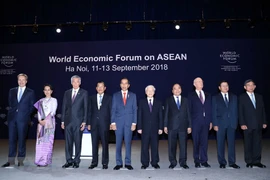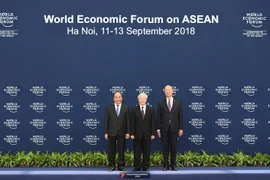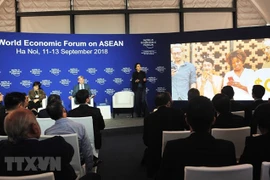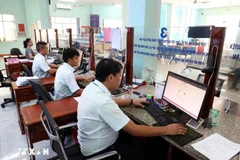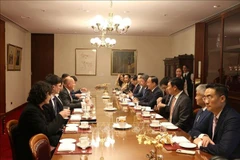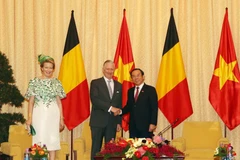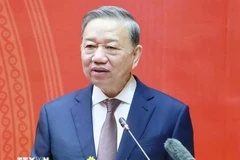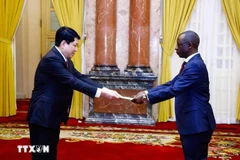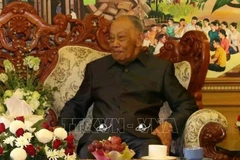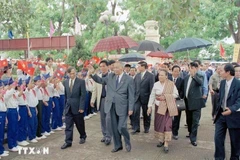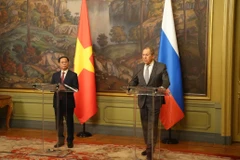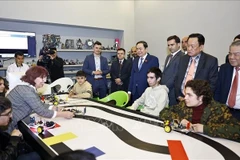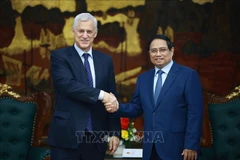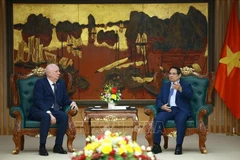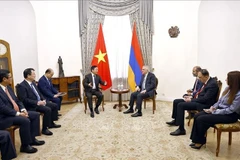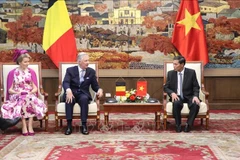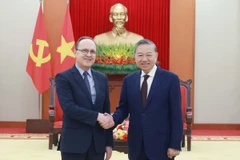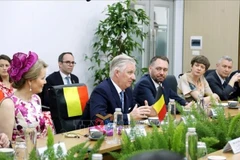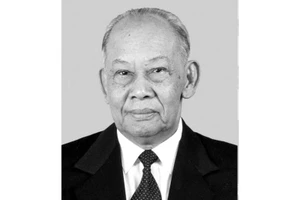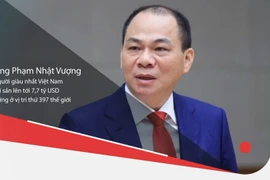Hanoi (VNA) – Prime Minister Nguyen Xuan Phuc gave aninterview to The Straits Times of Singapore on Vietnam’s policy making andstance on protectionism, ASEAN’s urgent issues and solutions to digitaleconomic development of Vietnam on the occasion of the World Economic Forum onASEAN (WEF ASEAN) 2018 that took place in Hanoi from September 11-13.
The following is the full text of the interview.
What are some of the best examples that showcase Vietnam’s entrepreneurship inits policy making?
Vietnam is one of the most open and dynamic economy in the region. In thespirit of integrity, development-enabling, action and service to the people andbusinesses, the Vietnamese government has put in place many policies to improvethe business environment and assist businesses. In policy-making, weconsistently hold that policies must create drivers and opportunities forenterprises and the people to do business. The satisfaction of the people andbusinesses is the criteria for measuring the effectiveness of policies and theperformance of state agencies in implementing policies. This spirit can beobserved in policy-making as follows:
First, the Vietnamese Government has policies to cultivate the startup andinnovation ecosystem and to promote the development of businesses, aiming forthe target of having at least 1 million enterprises by 2020. The 2014Investment Law has created a new investment policy framework, reflecting a newstate administration mindset. Accordingly, investors are free to do business inall sectors and industries that are not prohibited. In addition, the Governmentpicked 2016 as the year of the “start-up nation” and implemented the plan,“Supporting the national innovative start-up ecosystem until 2025”. Thesepolicies have created a vigorous wave of start-ups in Vietnam, and in 2017 webroke the record in the number of newly established business as more than127,000 new businesses came into being, 1.6 times as high as the figure in2011.
Second, the Government is focusing on improving the business climate andenhancing national competitiveness. Accordingly, we are actively reformingspecialized inspections, trimming more than 50 percent of the number ofexisting business requirements. We have introduced the “single-window”mechanism in administrative processes, and are making level-four public serviceconnectivity a requirement. Customs clearance is now entirely online andpaperwork is no longer required. Inspection for customs clearance is nowapplied to only 10 percent of goods, down from 30 percent previously. I myselffrequently meet and speak with businesses to encourage entrepreneurship andaddress hurdles in doing business. In addition, presently the VietnameseGovernment is redoubling efforts in implementing e-government to better enableadministrative reforms.
Third, Vietnam’s entrepreneurship is also reflected in our internationalintegration strategy. The development reality in Vietnam and other countries inthe world have demonstrated that economic integration and connectivity is a driverfor growth and employment. In spite of our status as a developing economy, Vietnamhas actively participated in next-generation free trade agreements, includingthe Comprehensive and Progressive Agreement for Trans-Pacific Partnership(CPTPP) and the EU – Vietnam Free Trade Agreement (EVFTA), with the potentialto foster entrepreneurship and improve the business climate in Vietnam. Theseagreements carry commitments that shall promote entrepreneurship and improvethe business environment in Vietnam.
Amid fears of a worsening global tradewar, what shall be Vietnam’s stance on protectionism? What is your opinionabout the level of free trade within ASEAN?
The reality of development in Vietnam in particular and ASEAN in generalhas demonstrated that trade is an important driver for growth and employment.Protectionism is not the answer for the prosperity of nations. Since thebeginning of our reform and open-door process in the late 1980s, it has beenour consistent policy to engage in regional and global economic integration atthe regional and global level alike. This has been clearly expressed throughour accession to ASEAN, APEC, ASEM and WTO, and particularly our participationin Free Trade Agreements (FTAs), including next-generation and high-standardones such as the CPTPP and EVFTA. Against the backdrop of mountingprotectionism and trade friction, Vietnam supports the promotion of a free,fair, transparent and rules-based multilateral trading system.
ASEAN is a leading region in the world in terms of economic connectivity and isstriving for greater intra-bloc liberalisation as well as more extensivecooperation with external partners.
Regarding intra-bloc cooperation, in terms of trade in goods, ASEAN isapproaching the goal of removing tariff barriers according to the ASEAN Tradein Goods Agreement (ATIGA) with 98.67 percent of ASEAN’s tariffs to be removedin 2018. The liberalization of trade in services and investment within ASEAN isalso meeting high standards, through the execution of commitment packageswithin the ASEAN Framework Agreement on Services (AFAS) and ASEAN ComprehensiveInvestment Agreement (ACIA).
Regarding external cooperation, ASEAN has now become the connecting hub forleading partners in the Asia-Pacific through a network of Free Trade Agreementsof 3 billion people and a total GDP of 20 trillion USD. The level ofliberalization between ASEAN and these partners is expected to increase evenfurther once the Regional Comprehensive Economic Partnership (RCEP) is signed.
However, to foster the Community’s economic strength, ASEAN countries need toenhance intra-bloc integration, trade and investment while simultaneouslyexpanding economic cooperation with partners and promote the role of ASEAN asan engine for regional economic connectivity.
In your view, what are the most pressing issues in ASEAN right now, for which innovativesolutions are required? Why?
“Innovationand resilience” is the theme of ASEAN 2018. In reality, “innovation” has alwaysplayed an integral role in the creation and growth of the Associationthroughout the last half century. That very innovation has helped ASEANovercome challenges, translate the Community into reality based on threepeople-centered pillars, and strive for common interests. More than ever, ASEANshould further foster the spirit of “innovation” to guarantee success in thecurrent context.
First of all, realising the ASEAN Community is a process built upon consensus,solidarity and unity. In that light,ASEAN should continue to uphold this spirit in its activities as well as in itsrelationship with external partners.
Secondly, ASEAN intra-bloc cooperation, particularly economic cooperation,requires new drivers at a higher level and with greater intensity, so as toharness the advantages of the 4th Industrial Revolution for a breakthrough. Toachieve this goal, developmental balance and harmony among ASEAN economies shouldbe the top priority in ASEAN cooperation today. For example, ASEAN intra-bloctrade turnover only accounts for less than 25 percent of the total trade volumeof ASEAN. Therefore, accelerating integration within ASEAN requires greatinnovation; this is also the key to affirm the resilience of our region. Assuch, in the future, we need to devote more efforts in this regard.
Last but not least, communication about the ASEAN Community should also begiven special attention. Until now, awareness about the ASEAN Community of eachcitizen and enterprise remains modest. This presents a huge challenge forpeople to directly contribute to the Community-building process as well as tohelp them benefit from what the Community has to offer. ASEAN should seek newand more innovative measures for citizens to become fully aware of and harnessthe Community-element of ASEAN.
Vietnam has a high mobile penetration rate and its people are digitallysavvy. How will the Government harness these strengths to grow the country’sdigital economy?
Vietnam has a young population that is digitally savvy. Around 60 percentof our population of 93 million are under 35, and approximately 54 percent areinternet users. This is a favorable foundation and a sufficiently large marketto cultivate the digital economy and accelerate investment into new businessmodels in Vietnam. Having identified the digital economy as one of the naturalcore pillars and is vital to economic development as the world enters the 4thIndustrial Revolution, our Government has implemented a number of policydirections as follows:
The Government shall establish an enabling environment, such as an ecosystemfor the development of digital economy. This shall first of all be manifestedin a legislative and policy environment as an expression of our consistentpolicy of openness and willingness to experiment with new business models onthe basis of the Fourth Industrial Revolution's digital platform. We also seekto create a ripple effect in the use of information and digital technology, andstep up economic restructuring and growth model transformation in closecoordination with digital transformation.
We shall focus effort in implementing e-government, with an aim towards digitalgovernment, digital economy and digital society, closely linked withinstitutional reforms and information technology application. We shallprioritise the comprehensive improvement of the legal framework and thesuperstructure for e-government; the establishment of the National PublicService Gateway, the National Census Database and other national databases; thepromotion of online public service provision at the third and fourth level tomeet the needs of the people and businesses, while paying due attention toensuring information security and safety.
Next in line is to develop a comprehensive system of informationinfrastructure, focusing on investing in and developing 4G and 5G networks; andencourage enterprises to invest in information infrastructure to ensure publicaccess. In addition, we are developing the necessary human resource for thedevelopment of the digital economy, particular in the information technologysector, through promoting information technology literacy as part of universaleducation, with the aim to equip all citizens with digital skills. We shallalso have policies to assist youths in startups, particularly those employingnew ideas in digital technology.
Lastly, promote the application of digital technology in all aspects ofsocio-economic life, particularly in such promising areas as agriculturalmanagement, manufacturing industry, logistics, digital finance, healthcare, etc. These effortsboth help increase the productivity, quality of services and competitiveness inthese areas, and create a vast market to encourage the development of the digitaleconomy. This is itself an opportunity for Vietnam to rise.-VNA

